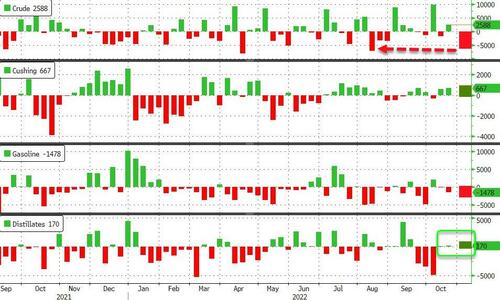WTI Holds Gains After Big Unexpected Crude Draw
Oil prices rallied today for the first time in 3 days after strong JOLTS data and rising geopolitical risks outweighed anxiety overFed-induced demand drags. Additionally renewed Zero-COVID lockdown easing rumors in China helped sentiment.
“Risks to energy supplies remain elevated after reports that Iran was planning an attack on targets that include Saudi Arabia and Northern Iraq,” said Edward Moya, senior market analyst at OANDA.
Meanwhile, “global economic outlook remains very fragile to a swathe of risks, and that should keep crude demand forecasts vulnerable to getting slashed, but for now energy traders remain fixated on how tight the market remains.”
For now, all eyes are on the API for any signs of distillates stocks rebuilding….
API
Crude -6.53mm (+267k exp) – biggest draw since June
Cushing +883k
Gasoline -2.64mm
Distillates +865k (-733k exp)
A much bigger than expected crude draw and unexpected distillates build were the highlights of the API report…
Source: Bloomberg
WTI hovered between $88 and $88.50 and extended gains after the print…
“We’re in a tale of two markets,” Joe McMonigle, the International Energy Forum’s secretary-general, told Bloomberg TV at the Adipec conference in Abu Dhabi.
“The physical markets are very tight. The paper markets are pricing in bad economic news and a bad recession.”
Meanwhile, President Joe Biden’s suggestion that US oil companies are profiting from Russia’s war in Ukraine was “absolutely outrageous,” according to the trade group representing American oil and natural gas companies.
“The statement itself was outrageous, and I would certainly hope that the President would reconsider such statements in the future,” Mike Sommers, chief executive officer for the American Petroleum Institute, told reporters Tuesday on a conference call.
“A number of API member companies who have joint ventures in Russia withdrew from those before the federal government mandated those withdrawals.”
Sommers on the call also reiterated points he made Monday that a windfall tax on oil and gas companies would actually discourage investment in new production at a time when the US should be encouraging more output.
Tyler Durden
Tue, 11/01/2022 – 16:39

